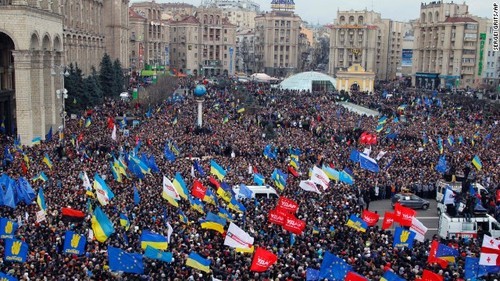
By: Ivan Barić
Note: The below content is the opinion of the author alone and should therefore not in any way, shape, or form be construed as the opinion of The Political Student’s editorial staff.
The relationship between Russia and the Ukraine has been strained ever since the latter gained their original independence in 1917, several years before the formation of the USSR.
The plains of Ukraine were historically one of Russia’s most prosperous areas, even going as far as being called the “Russian Granary.” In the modern era agricultural goods remains the Ukraine’s largest trade good. Their largest agricultural deal with the European Union brings in approximately $5 billion(US) a year, while their machinery and equipment trade with Russia produces about $7 billion().
This give both Russia and the European Union a desire to improve their influence in Ukraine. However the nation is being torn apart due to the political infighting for control between their two larger trading partners, and also because of the countries historical divide between East and Western Europe. The Ukrainian people have always been struggling to find their identity; having been a divided between the west represented by the EU, and the east represented by Russia.
Each side of this divide have invested heavily within the Ukrainian infrastructure. The EU and Russia both control more than a third of The Ukraine’s foreign trade. Neither investor is willing to let go until their initial investments have been repaid, with interest.
In a press conference at the International Trade Center in Krasnaya Presnya on December 19, 2013, Russian President Vladimir Putin, declared that it is in Russia’s best interest to promote a strong relationship with the Ukraine; he further elaborated, saying “Third parties shouldn’t address us asking us to lower natural gases for Ukraine, if they want to help, they are welcome.” This demonstrates that Putin is subtly signaling that pro-Western and western powers should keep their noses out and not meddle into Eastern European affairs.
Putin added that Russia had agreed to throw a lifeline to Ukraine’s struggling economy by investing $US15 billion ($A16.82 billion) and agreeing on a deal to slash gas prices from around $400(US) to a price of $268.50 (US) for 1,000 cubic metres. Putin later quipped that the Ukraine is “strategic partner and ally country”, whom they want to help, and Ukrainian-Russian relationship is more economically vital than the Ukrainian-EU relationship.
He explained that the Ukraine won’t be able to maintain their current economical relationship with Russia if they join the EU trade Association, because the EU will force their trade laws and practices upon Ukraine, making transactions between Russia and the Ukraine. The long term effects of this action would cause the Ukrainian economy to suffer another recession, since the Ukrainian trade with Russia delivers Ukraine $far more than their European counterparts.
Ever since the inauguration of President Viktor Yanukovich, Ukraine has slowly strengthened relationships with Russia, turning their back to the pro-western European Union. In fact in 2010 Yanukovich rejected the NATO invitation to begging joining MAP, or Membership Action Plan, the proverbial fast track for membership into the EU.
Should the US be concerned with the protests in the Ukraine right now? It is hard to tell. A wave of “Pro Democratic” changes engulfed Middle East in 2010 and continues today, why can’t Ukraine be the first Eastern European nation to embrace those same values. The question is – how to react?
I advise that it would be better not to mull over any definitive measure which could backfire upon the US; especially as it may cause a strong backlash from the Ukrainian people. In spite of this it is necessary for something to be done in order to send a message towards authoritarian democracies, that unilateral intimidation and shady business practices are not to be tolerated, and that a true democracy is one where its leaders fear the people and not the other way around.
